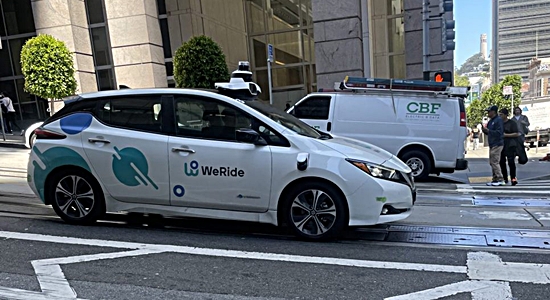
What is China doing with the data?
Widely reported Chinese spy balloons or Chinese cyber-hacks of cabinet-level email are not the only ways that the Chinese government gathers detailed information about the United States that may be used to compromise infrastructure and institutions or even help wage war. Fortune’s Rachyl Jones reports that “Chinese self-driving cars have quietly traveled 1.8 million miles on U.S. roads, collecting detailed data with cameras and lasers” (July 8, 2024).
Miles and miles
That’s “1.8 million miles of California” traveled by self-driving cars that are owned or partly owned by Chinese companies, companies that cannot exist without regard to the wishes of the Chinese Communist Party.
As part of their basic functionality, these cars capture video of their surroundings and map the state’s roads to within two centimeters of precision. Companies transfer that information from the cars to data centers, where they use it to train their self-driving systems….
Among the 35 companies approved to test by the California DMV, seven are wholly or partly China-based. Five of them drove on California roads last year: WeRide, Apollo, AutoX, Pony.ai, and DiDi Research America. Some Chinese companies are approved to test in Arizona and Texas as well.
Fitted with cameras, microphones, and sophisticated sensors, self-driving cars have long raised flags among privacy advocates. Matthew Guariglia, a policy analyst at the digital rights nonprofit Electronic Frontier Foundation, called self-driving cars “rolling surveillance devices” that passively collect massive amounts of information on Americans in plain sight.
In the context of national security however, the data-hungry Chinese cars have received surprisingly little scrutiny.
Fortune’s review of privacy policies indicates that at least some of the Chinese car companies “appear to store U.S. data in China.” The Chinese government would of course have access to the data, data that “could provide a foreign adversary with a treasure trove of intelligence that could be used for everything from mass surveillance to war planning….”
No U.S. federal agencies charged with overseeing the testing of self-driving cars have an exact idea of what data the Chinese cars are collecting or what they do with it.
Audio, video, radar, sonar, GPS, Lidar
But we do know that vehicles tend to be “equipped with about a dozen external cameras, a few audio recording devices, and half a dozen sensors that use laser beams and radio waves to determine the exact locations of surrounding objects…. One autonomous car fitted with cameras, radar, sonar, GPS, and Lidar collects about 4 terabytes of data per day, according to a 2016 keynote by Intel’s then-CEO Brian Krzanich. That information then gets stored for subsequent use by employees to train the self-driving algorithms.”
Data that can be used for one purpose can also be used for other purposes.
According to Missy Cummings, an engineering professor at George Mason University, “We just don’t have a government in place now that has the technical literacy—at all agencies—to deal with the autonomous functionality plus data privacy plus cybersecurity.”
If so, this means that we don’t have a government in place that is taking the risks to security seriously.
Meanwhile, observes Representative Raja Krishnamoorthi, a member of the House Select Committee on the Chinese Communist Party, Americans “are not allowed to test our autonomous vehicles in China.”





